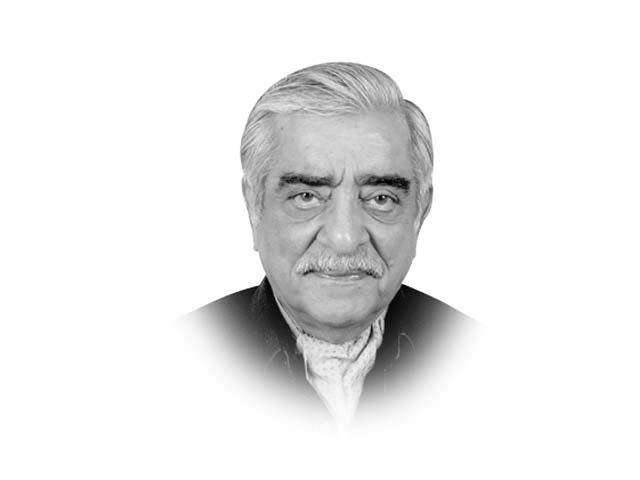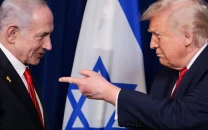Afghanistan’s successful election day
The election has established that a vast majority of the Afghans have rejected the Afghan Taliban.

The writer was foreign secretary from 1994-97 and also served as Pakistan’s ambassador to Iran (1992-94) and the US (1990-91)
The Afghans did so even though the level of violence in Afghanistan had been rising with civilian casualties in 2013 being seven per cent higher than in 2012 and with the Afghan Taliban launching spectacular attacks on such icons as the Serena Hotel in Kabul and the headquarters of the IEC on the eve of the elections. Afghan Taliban spokesperson Zabiullah Mujahid claimed that the Taliban had launched some 2,000 attacks on Election Day but no more than dozens were conceded by the Afghan Security forces, which did a yeoman job in protecting polling centres and the voters.
There had been a real fear that since some 21 million voter cards had been issued, while there were only 12 million eligible voters, and since candidates and their agents had been purchasing such cards at five dollars each from October onwards, that there would be large-scale ballot stuffing repeating the fiasco of the 2009 election. So far reports suggest this did not happen and that almost all of the seven million votes cast were genuine.
There were, of course, many glitches. Of the almost 7,000 polling centres originally proposed, approximately 13 per cent had to be removed from the list for security reasons. In polling centres in such insecure provinces as Logar and Wardak, many polling centres had more officials and observers than voters. But there were also reports of large turnouts in such troubled provinces as Zabul, Uruzgan and Kandahar in the South and Kunar in the East, even though these provinces were regarded as Taliban strongholds. On the other hand, ballot papers ran out by midday in a number of polling centres and not all of them could be resupplied, depriving many Afghans of the opportunity to vote.
Did ethnicity play a part in determining voting patterns? The new election regulations required that the first count of votes be made at each polling centre and the numbers be posted on the outside of the polling centre. In what could admittedly be only a limited survey of polling centres in Kabul, a Washington Post reporter found that Dr Abdullah had secured 75 per cent of the vote in Tajik and Hazara neighbourhoods, while Ashraf Ghani secured 18 per cent and in Pashtun neighbourhoods, the pattern was reversed.
Two conclusions can be tentatively drawn. First that ethnicity was, despite the multi-ethnic tickets on which the candidates were contesting, a determinant of the voting pattern. The second, that among the Pashtun candidates, it is Ashraf Ghani who is drawing the vote.
Dr Ghani has claimed on Twitter that in his estimate he has secured more than 50 per cent of the vote and will be declared the winner. Dr Abdullah and his supporters have made the same claim. My own feeling, shared by most observers, is that no candidate will secure majority and that a run-off election will be held in late May. This will pit Dr Abdullah against Mr Ashraf Ghani. Given the Pashtun plurality in the country and given the almost blind loyalty the Uzbeks comprising nine per cent of the population owe to Ashraf’s running mate, Rashid Dostum, it is more than likely that Ashraf Ghani will be the next President of Afghanistan. His inauguration will not, however, be until June unless, as happened in 2009, Abdullah withdraws his candidature and arrives at some power-sharing compromise with Ashraf.
It is also clear that on assumption of office the new president will sign the Bilateral Security Agreement with the USA ensuring continued support for the Afghan armed forces and for the beleaguered Afghan economy, and that in so doing he will have the support of the Afghan people. In Washington, thinking appears to be that the force will stay only till the end of Obama’s term and will not be more than 10-12,000 persons.
Prime Minister Nawaz Sharif has welcomed the success of the election and has reiterated Pakistan’s interest in contributing to the restoration of peace and stability in Afghanistan. Pakistan has long maintained that an Afghan-led and Afghan-owned peace process entailing negotiation with the “armed opposition” would have Pakistan’s support. The election has established that a vast majority of the Afghans have rejected the Afghan Taliban and the new president, with the legitimacy of the vote behind him, can therefore negotiate with the Taliban from a position of relative strength and ensure that they make no excessive demands. All those who can influence the Taliban, foremost among them the Pakistan “establishment”, must make the Afghan Taliban aware of the change that the election has wrought in Afghanistan’s political landscape.
This is imperative because without some such settlement in Afghanistan, Pakistan will be hard put to win its own internal battle against extremism and such divisive forces as the TTP, whose links to the Afghan Taliban only the most foolish among us can ignore. Let me repeat, as I said in my last article, that tolerating the Afghan Taliban obduracy could only lead them seeking to use Pakistan as their “strategic depth” in tandem with the TTP.
Published in The Express Tribune, April 8th, 2014.
Like Opinion & Editorial on Facebook, follow @ETOpEd on Twitter to receive all updates on all our daily pieces.



















COMMENTS
Comments are moderated and generally will be posted if they are on-topic and not abusive.
For more information, please see our Comments FAQ